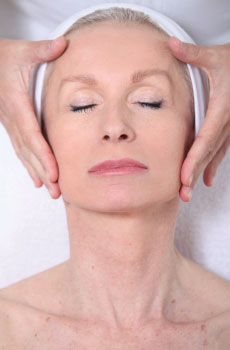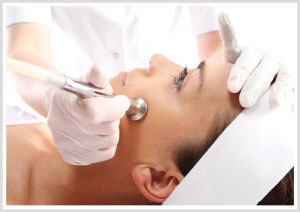I think the worst part of writing this article was that I had the “slapped in the face” realization that “oh no, this is me!” Although I am not quite yet experiencing the physiological characteristics, my age is certainly applicable as is the horrific realization that yes, I am getting older!
So though my mindset of “30-something” keeps me in skinny jeans and knee-high boots, my body is clearly aware of the senescent truth! In any case, it is what it is, and I embrace not only every wrinkle that defines my life (not really) but every phase of womanhood as well. The years have been good to me and I can honestly say that I love being a woman!
 As a skin care practitioner and educator, I am constantly preaching the absolute necessity of professionals and students to identify the link between lifestyles and “life” to the condition of the skin. Long gone are the days of the “fluff and buff” facial; as skin care professionals, we have emerged into an amazing era of becoming our clients right-hand partner in meeting the needs of their skin concerns, as well as helping them defy the signs of aging. The amazing advancement in both skin care ingredients and treatments has empowered us with fabulous abilities to have a substantial and noticeable impact on the condition of the skin. However, this can only be possible when we – one, completely know our products, ingredients, and their benefits – and two, not only perform a thorough and complete client consultation, but also know what to do with it! This, I am sure that each reader is an expert.
As a skin care practitioner and educator, I am constantly preaching the absolute necessity of professionals and students to identify the link between lifestyles and “life” to the condition of the skin. Long gone are the days of the “fluff and buff” facial; as skin care professionals, we have emerged into an amazing era of becoming our clients right-hand partner in meeting the needs of their skin concerns, as well as helping them defy the signs of aging. The amazing advancement in both skin care ingredients and treatments has empowered us with fabulous abilities to have a substantial and noticeable impact on the condition of the skin. However, this can only be possible when we – one, completely know our products, ingredients, and their benefits – and two, not only perform a thorough and complete client consultation, but also know what to do with it! This, I am sure that each reader is an expert.
The one note I also want to make before going too much further is that, of course, we are not doctors, and making claims and connections between our clients’ lifestyle, health, and the condition of their skin may seem beyond our scope of practice. The reality is that it is common sense and quite honestly, every skin care professional’s responsibility.
UNDERSTANDING MENOPAUSE
All of that being said, let us begin this topic with an understanding of what menopause really is. We are all familiar with the term and the common side effects of hot flashes and horrific mood swings, but do you really understand what is physiologically happening within the body? I was a bit surprised how many women that I asked really did not know, or maybe just did not want to know!
The Physiological Aspectof Menopause
Aging happens and there is not a whole lot we can do about it. The onset of menopause can begin at various ages, depending upon individual life factors. Generally speaking, the average age is between 45 to 55, with the transition period often referred to as pre-menopause, beginning on an average of four years prior. It is during this time that the ovaries begin to slow the release of eggs and the production of estrogen. Menopause is identified by a 12-month time frame of no menstrual cycle, a time in which the ovaries no longer release any eggs and cease the production of estrogen.
During the transition stage and throughout menopause, women can experience an array of hormone-related symptoms. Each woman is completely different and each woman experiences not only different symptoms, but different magnitudes of each symptoms. Another important factor to keep in mind is that every woman also handles this time period, psychologically, in a completely different way. Some women embrace it, sort of as another milestone of womanhood. Others do not quite have the same welcoming attitude, and some are emotionally annihilated by the change. Common symptoms of menopause can include some or all of the following:
- Hot flashes
- Night sweats and/or
- cold flashes
- Vaginal dryness and a discomfort during sex, as well as a change in sexual desire
- Worsening of premenstrual syndrome (PMS)
- Irregular periods or periods that are heavier or lighter than usual
- Difficulty concentrating and temporary memory lapses
- Weight gain
- Insomnia
- Emotional changes (irritability, mood swings, mild depression)
- Headaches
- Breast tenderness
- Racing heart
- Joint and muscle aches and pains
- Dry skin, eyes, or mouth
- Hair loss or thinning
Very few of the noted side effects are anything that skin care professionals are going to be able to notice. Hence, the critical necessity for thorough consultation forms and processes with every client. It is absolutely necessary that questions about menopause are a part of the consultation process, for two very critical reasons; first, they actually have a direct impact on the condition and functioning of the skin; second, their emotional and psychological impact on a woman will in turn also have a physiological effect on the skin. We all know that stress, as well as internal emotional unrest, can have a direct impact on hormone functioning and, in turn, on the condition of the skin.
As skin care professionals, it is our responsibility to use our knowledge and expertise to help customers have the healthiest, most youthful skin that they can. We can only do this when we have a complete understanding of any and everything that could be affecting the skin, menopause included.
HOW TO IDENTIFY MENOPAUSE
Let us now take a look at the specific identifying characteristics that our customers will experience and that our products and services can help to improve.
As noted above, the main hormonal alteration during menopause is the drop in estrogen production. As estrogen levels begin to decline, they have a direct impact on the decline of collagen and elastin in the skin. The lack of repair of collagen and elation fibers results in a loss of firmness and resilience, an increase in lines and wrinkles, and a loss of contour in the skin. Now remember, this process actually begins years before actual menopause.
In addition to the critical impact on collagen and elastin, the lack of estrogen has several other physiological effects on the skin. Estrogen levels have been linked to the formation and stability of blood capillaries in the dermis. Blood supply in the dermis provides essential nutrients to the skin for cellular growth and reproduction, as well as a supply of oxygen for optimal functioning of all cellular activity. A lack of blood flow results in a diminished cellular function and the eventual thinning of the epidermis and its protective barriers.
As estrogen levels decrease, guess what increases? You got it… testosterone levels! As skin care professionals, we all know what is directly linked to elevated testosterone levels… Increased sebaceous gland activity results in thicker sebum production and an increase in the appearance of oily skin, as well as acne breakouts. Some women who have never had issues with acne breakouts will find themselves suddenly distraught with pimples!
Estrogen levels also play a role in hampering or keeping the activity of the melanocytes in the basal layer under control. However, what is most interesting is that our melanocytes have a memory; they tend to be more quickly activated in areas in which they have been active in the past, which would be areas of repetitive ultraviolet exposure or damage. When estrogen levels begin to diminish, it is not at all uncommon to see a more rapid appearance of defined areas of pigmentation.
Finally, to top things off, the lack of estrogen resulting in the increase of testosterone levels can also result in an increase in facial hair, particularly around the mouth and on the chin… just what every woman wants!
Menopausal skin can be identified by the host of manifestations mentioned above, but it is not our job as skin care professionals to determine that it is the cause… it is the thorough consultation with the client that will make such a determination. Once you establish the cause, you can better address the issue.
 TREATMENT
TREATMENT
I could proceed and list multiple treatment options, but each skin care professional has their own menu of services and products and can best determine what will deliver appropriate results. What I can list are the results that we want to achieve with menopausal skin, depending upon the manifestation that the client is experiencing.
The first objective is to increase collagen production. This is accomplished by recommending treatments that promote cell turnover – microdermabrasion, lactic peels, LED, and other light therapies. Key ingredients include vitamin A, vitamin C, and peptides.
The second objective is to improve the integrity and increase the thickness of the epidermis. This is accomplished with treatments such as LED and light therapies, as well as microdermabrasion infusion treatments that gently exfoliate while saturating the skin with nutrient rich ingredients. Key ingredients include vitamin C, vitamin E, hyaluronic acid, and peptides.
The third objective, for those clients experiencing adult acne, mild alpha hydroxy acids and enzyme treatments will do the trick. These clients are not candidates for salicylic acid and benzoyl peroxide products on a daily basis because they dehydrate and dry the skin, but for occasional use they can absolutely combat excess oil and breakouts. Spot treatment home care products are also an option.
The final objective, which should be part of every skin care regimen regardless of stage of life, is sunscreen! It should be applied every day, all year long! Here is the deal… Life happens whether we like it or not and as skin care professionals, arming ourselves with the knowledge of life changes that impact the skin will make us irreplaceable in clients’ eyes. No woman wants to experience the aging process alone and we all want to be assured that not only are we not going at it alone, but that we have a guardian angel to get us through… Well, at least a skin guardian angel!
Michelle D’Allaird is a New York State licensed aesthetician and International CIDESCO Diplomat. She is the owner of the Aesthetic Science Institute aesthetic schools in Syracuse and Latham, N.Y. She is a consultant and educator for international cosmetic companies around the world. D’Allaird is a contributing author to major industry trade magazines, as well as a host and speaker for International Congress of Esthetics and Spa conferences in Miami, Philadelphia, Dallas, and Long Beach. She is also a co-author of Salon Fundamentals, an aesthetic textbook. Her expertise lies in education and curriculum development for aesthetic, medical, and laser courses.
Want to read more?
Subscribe to one of our monthly plans to continue reading this article.